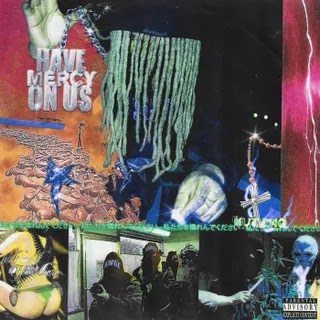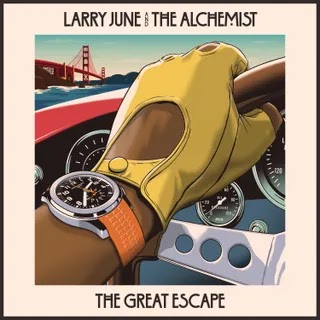The latest album from the Tampa duo is a hard rap record made by and for music geeks.
In the late 1980s, the world experienced a second Summer of Love, when the spirit of freedom—and hedonism—once shared by psychedelic San Francisco hippies in 1967 was revitalized in the United Kingdom, fostered in illegal underground raves fueled by MDMA and acid house imported from the shores of Ibiza. Rave culture spread around the world like wildfire, and few places embraced it like Florida, where scenes coalesced in places like Miami, Tampa, Orlando, and Gainesville, making the state a rave capital for much of the ’90s. They Hate Change, a rap duo from Tampa steeped in the myriad electronic subgenres that permeated their home state, represent the latest stage in the evolution of sounds that traveled from Chicago to Ibiza, from London to Miami. On their latest LP, Finally, New, they spit aggressive, East Coast-flavored braggadocio raps over UK breaks and drum’n’bass beats filtered through local styles like Tampa jook and Miami bass. Even amid a deluge of rap music made with sounds from the club, little else sounds like this.
THC’s Vonne Parks and Andre Gainey self-produce bedroom rap records with dance beats, producing bouncy, propulsive records with syncopated percussion that stutters and skitters, creating pockets big enough for them to slide in and out of with a casual flair. They’re certainly not the first artists at the intersection of rap and electronic dance music, but they’ve somehow managed to synthesize the dialogue between Florida and the UK, adding a Southern hip-hop swagger that scans more art school than Magic City. Vonne and Andre got their first taste of the club scene at all-ages “teen night” dance parties in Tampa soundtracked by jook and krank music; if you squint you can hear the homage to Iceberg’s stripper anthem “Naked Hustle” on “Certi.” They tip their caps throughout to the Tampa scene in which they came up, even granting a guest spot to local MC Sarge, who first taught Vonne how to rap. But mostly, Finally, New is the result of a group that outgrew its local scene—one they never truly fit into anyway.
Many of the references will be intimately familiar to a certain subset of club denizens; the album’s lone instrumental track “Perm” is their version of a Schematic record, an IDM-obsessed Miami label that bridged the gap between the sample-and-static-heavy sounds of Boards of Canada and Autechre and the “ghetto bass” that was taking over South Florida.
The most fun parts of Finally, New are distinctly Floridian: Miami Bass slaps and nods to the various substyles that sprouted in Tampa. There’s hints of jook legends Tom G and Khia, who had the subgenre’s biggest hit in 2002 with “My Neck, My Back,” and they once again sample the iconic “Come on baby…” hook from Duice’s classic booty bass jam “Dazzey Duks.” And while they produced the record themselves, they managed to find a kindred spirit in Nick León, a Miami producer who has also carved out space at the intersection of European club music and rap on solo albums and early tracks with Denzel Curry. León contributes co-production to the record’s final tracks (“X-Ray Spex” and “From the Floor”), sending the album out in a swirl of fluttering snares that owes as much to Chicago footwork as the bass does to Bristol.
A surface scan of the tough talk and boasts that pepper Finally, New can obscure the fact that it’s a hard rap record made by music geeks; Vonne and Andre are internet seekers, curious aesthetes diving into the deepest nether regions of a culture they’ve only ever been able to observe from afar, even as they immersed themselves in their local scene. Their lyrics reflect their outsider status, with signifiers meant to place them in opposition to the mainstream. Instead of private jets and gold jewelry, they flex vintage instant cameras and designer dogs. Vonne references their gender fluidity with flip references to makeup and Fenty lingerie, name dropping icons like Jackie Shane, X-Ray Spex’s Poly Styrene, and 100 Gecs’ Laura Les. The result is a significant amount of dissonance; swagger with obscure signifiers, tough guy talk from someone experiencing dysmorphia.
It’s in these moments that They Hate Change transcend the sum of their influences and find something truly new. On the standout “Some Days I Hate My Voice,” co-produced by Titmouse, Vonne explores the latent power of an identity in flux. “Some days I hate my voice, some days I feel like I’m the Metatron/Some days I’m basic, some days I’m dolled up like a debutante/Some day I’ll have a closet full of tweed Chanel, pastel on my Black self/Showed up like can’t these cats tell how to rap well?” Holding vulnerability with the same hands as power, Vonne renders their queerness in three dimensions, seeking neither pity nor praise. On a record full of boasts, it’s the moment with the most impact.
Finally, New is They Hate Change’s first LP for Jagjaguwar—a storied indie label better known for Bon Iver and Sharon Van Etten than any hip-hop or electronic music—but they are no rookies, having dropped eight releases since debuting in 2015 with Cycles. So while they may benefit from a nostalgic dance music resurgence embraced by reggaetón stars and TikTok zoomers alike, they’ve distilled an encyclopedia worth of references into a sound distinct enough that it’s unlikely to wash out when the wave recedes.
















0 comments:
Post a Comment